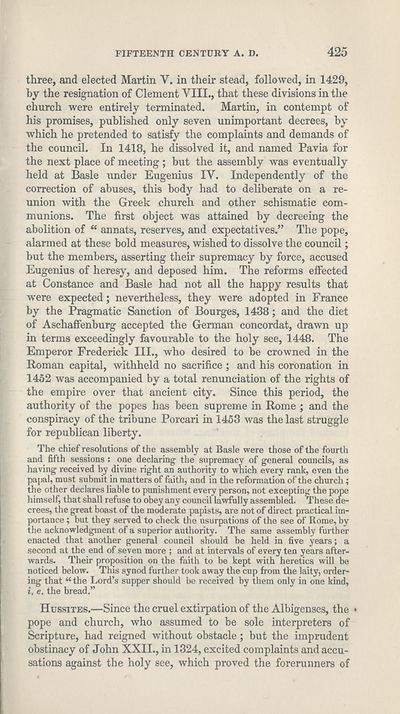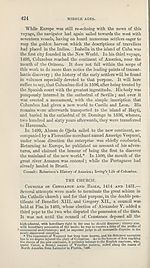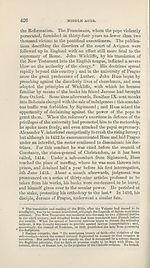Download files
Complete book:
Individual page:
Thumbnail gallery: Grid view | List view

FIFTEENTH CENTURY A. D.
425
three, and elected Martin V. in their stead, followed, in 1429,
by the resignation of Clement VIII., that these divisions in the
church were entirely terminated. Martin, in contempt of
his promises, published only seven unimportant decrees, by
which he pretended to satisfy the complaints and demands of
the council. In 1418, he dissolved it, and named Pavia for
the next place of meeting ; but the assembly was eventually
held at Basle under Eugenius IV. Independently of the
correction of abuses, this body had to deliberate on a re¬
union with the Greek church and other schismatic com¬
munions. The first object was attained by decreeing the
abolition of “ annats, reserves, and expectatives.” The pope,
alarmed at these bold measures, wished to dissolve the council;
but the members, asserting their supremacy by force, accused
Eugenius of heresy, and deposed him. The reforms efifected
at Constance and Basle had not all the happy results that
were expected; nevertheless, they were adopted in France
by the Pragmatic Sanction of Bourges, 1438; and the diet
of Aschaffenburg accepted the German concordat, drawn up
in terms exceedingly favourable to the holy see, 1448. The
Emperor Frederick III., who desired to be crowned in the
Roman capital, withheld no sacrifice ; and his coronation in
1452 was accompanied by a total renunciation of the rights of
the empire over that ancient city. Since this period, the
authority of the popes has been supreme in Rome ; and the
conspiracy of the tribune Porcari in 1453 was the last struggle
for republican liberty.
The chief resolutions of the assembly at Basle were those of the fourth
and fifth sessions : one declaring the supremacy of general councils, as
having received by divine right an authority to which every rank, even the
pa|>al, must submit in matters of faith, and in the reformation of the church;
the other declares liable to punishment every person, not exceptingthe pope
himself, that shall refuse to obey any council lawfully assembled. These de¬
crees, the great boast of the moderate papists, are not of direct practical im¬
portance ; but they served to check the usurpations of the see of Rome, by
the acknowledgment of a superior authority. The same assembly further
enacted that another general council should be held in five years; a
second at the end of seven more ; and at intervals of every ten years after¬
wards. Their proposition on the faith to be kept with heretics will be
noticed below. This synod further took away the cup from the laity, order¬
ing that “ the Lord’s supper should be received by them only in one kind,
i, e. the bread.”
Hussites.—Since the cruel extirpation of the Albigenses, the •
pope and church, who assumed to be sole interpreters of
Scripture, had reigned without obstacle; but the imprudent
obstinacy of John XXII., in 1324, excited complaints and accu¬
sations against the holy see, which proved the forerunners of
425
three, and elected Martin V. in their stead, followed, in 1429,
by the resignation of Clement VIII., that these divisions in the
church were entirely terminated. Martin, in contempt of
his promises, published only seven unimportant decrees, by
which he pretended to satisfy the complaints and demands of
the council. In 1418, he dissolved it, and named Pavia for
the next place of meeting ; but the assembly was eventually
held at Basle under Eugenius IV. Independently of the
correction of abuses, this body had to deliberate on a re¬
union with the Greek church and other schismatic com¬
munions. The first object was attained by decreeing the
abolition of “ annats, reserves, and expectatives.” The pope,
alarmed at these bold measures, wished to dissolve the council;
but the members, asserting their supremacy by force, accused
Eugenius of heresy, and deposed him. The reforms efifected
at Constance and Basle had not all the happy results that
were expected; nevertheless, they were adopted in France
by the Pragmatic Sanction of Bourges, 1438; and the diet
of Aschaffenburg accepted the German concordat, drawn up
in terms exceedingly favourable to the holy see, 1448. The
Emperor Frederick III., who desired to be crowned in the
Roman capital, withheld no sacrifice ; and his coronation in
1452 was accompanied by a total renunciation of the rights of
the empire over that ancient city. Since this period, the
authority of the popes has been supreme in Rome ; and the
conspiracy of the tribune Porcari in 1453 was the last struggle
for republican liberty.
The chief resolutions of the assembly at Basle were those of the fourth
and fifth sessions : one declaring the supremacy of general councils, as
having received by divine right an authority to which every rank, even the
pa|>al, must submit in matters of faith, and in the reformation of the church;
the other declares liable to punishment every person, not exceptingthe pope
himself, that shall refuse to obey any council lawfully assembled. These de¬
crees, the great boast of the moderate papists, are not of direct practical im¬
portance ; but they served to check the usurpations of the see of Rome, by
the acknowledgment of a superior authority. The same assembly further
enacted that another general council should be held in five years; a
second at the end of seven more ; and at intervals of every ten years after¬
wards. Their proposition on the faith to be kept with heretics will be
noticed below. This synod further took away the cup from the laity, order¬
ing that “ the Lord’s supper should be received by them only in one kind,
i, e. the bread.”
Hussites.—Since the cruel extirpation of the Albigenses, the •
pope and church, who assumed to be sole interpreters of
Scripture, had reigned without obstacle; but the imprudent
obstinacy of John XXII., in 1324, excited complaints and accu¬
sations against the holy see, which proved the forerunners of
Set display mode to:
![]() Universal Viewer |
Universal Viewer | ![]() Mirador |
Large image | Transcription
Mirador |
Large image | Transcription
| Antiquarian books of Scotland > Education > Elements of universal history on a new and systematic plan > (445) |
|---|
| Permanent URL | https://digital.nls.uk/127585480 |
|---|
| Description | Thousands of printed books from the Antiquarian Books of Scotland collection which dates from 1641 to the 1980s. The collection consists of 14,800 books which were published in Scotland or have a Scottish connection, e.g. through the author, printer or owner. Subjects covered include sport, education, diseases, adventure, occupations, Jacobites, politics and religion. Among the 29 languages represented are English, Gaelic, Italian, French, Russian and Swedish. |
|---|

